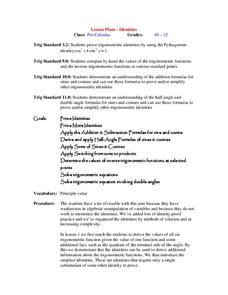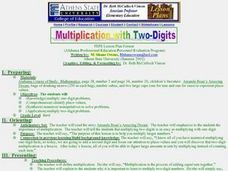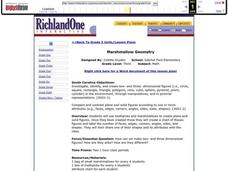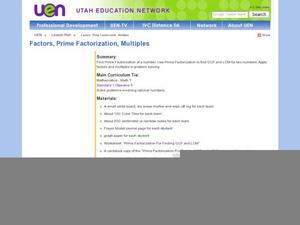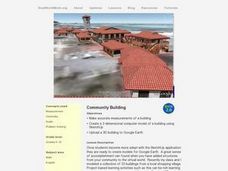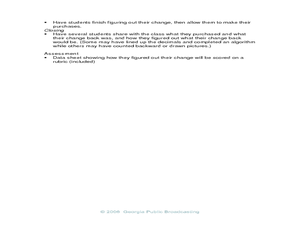Curated OER
Identities and Trigonometric Values
Students solve trigonometric equations. In this precalculus lesson, students prove trigonometric identities using the Pythagorean Theorem. They apply the addition formulas for sine and cosine to prove different identities.
Curated OER
The Flat Earth
Pupils differentiate between different planes. In this geometry lesson, students differentiate between a plane and a sphere. They discuss the Great Circle, Geodesic and Lune as it relates to the earth.
Curated OER
Multiplication With Two Digits
Third graders multiply one and two digit problems, identify place value, and maneuver manipulatives to solve problems.
Curated OER
Marshmallow Geometry
Third graders create 2D and 3D shapes using marshmallows and toothpicks. In this geometry lesson, 3rd graders create their shapes and document the number of faces, edges, corners, angles, and sides. They share one shape and its...
Curated OER
Using Geometric Shapes in Architecture
Third graders identify two and three dimensional shapes used in architectural designs by viewing images on the Internet. In this geometry lesson, 3rd graders create their own building designs and identify the geometric shapes that will...
Curated OER
Let's Take a Chance!
Students investigate probability and the chance of an even happening. In this algebra lesson, students incorporate their knowledge of probability to solve problems and relate it to the real world. They learn to make decisions based on data.
Curated OER
Bar Charts and Pictographs: How can they help us?
First graders work with manipulatives to solve various math problems by using concrete objects to solve a list of problems . They create and evaluate bar graphs and write a statement about the information on their bar graph.
Curated OER
Primary Geometry
Students identity simple geometric shapes. In this early geometry lesson, the teacher introduces students to triangles, squares, and rectangles, then students identify and classify the shapes as they are found in the classroom. To...
Curated OER
Saving Makes Cents
Students identify ways families save money. For this financial lesson, students read the book A Chair for My Mother and discuss ways to save money. Students identify coin values and practice counting money.
Curated OER
Factors, Prime Factorization, Multiples
Seventh graders examine Prime Factorizations, Multiples, and Factors. In this prime number, factorization, and multiples lesson plan, 7th graders identify greatest common factors and least common multiples. Students use problem solving...
Curated OER
Triangle Attributes and Measures
Seventh graders explore the concept of triangles. In this triangles lesson, 7th graders sort triangles according to various attributes such as acute, obtuse, isosceles, or equilateral. Students find the area and perimeter of triangles.
Curated OER
Box and Whisker Plots
Seventh graders explore the concept of box and whisker plots. In this box and whisker plots lesson, 7th graders plot data on a box and whisker plot. Students discuss the mean, median, and mode of the data. Students discuss range,...
Curated OER
Linking Length, Perimeter, Area, and Volume
Learners explore measurements of rectangles. For this measurement comparison lesson, students discover the length, width, perimeter, and area of two different rectangles. Learners record their measurements on a chart to make comparisons.
Curated OER
Investing
Students collect data on investments and draw conclusions. In this algebra lesson, students analyze exponential graphs as they relate to money. They discuss the cause of an account balance being high or low.
Curated OER
Community Building
Pupils build different shapes using sketches. In this geometry lesson, students explore measurements and units as they build and create models of buildings. They use SketchUp to create and manipulate shapes.
Curated OER
Introduction to Fractions Using Cuisenaire Rods
Fifth graders use Cuisenaire rods in order to discover how to represent fractions with real objects. In this lesson on fractions, 5th graders first examine and learn the colors, lengths, and numerical values of each rod; then, students...
Curated OER
Composite Functions
Students create a poster to explain composite functions. In this composite function worksheet, students explore linear equations and functions. They complete a worksheet and use manipulatives to complete problems.
Curated OER
Unit 2 Sun & Stars
Young scholars describe stellar objects using terms such as stars, planets, satellites, orbits and light. In this sun and stars unit, students research stellar objects through seven individual lessons discovering star characteristics,...
Curated OER
Spending - Maintaining the skill of money
Third graders practice making change with money. In this subtraction instructional activity, 3rd graders watch a video about money. Students investigate what it means to earn money, spend it, and find their change.
Curated OER
The Magic Pot
Students read the story The Magic Pot and complete language arts based activities based on the story. In this language arts lesson plan, students discuss, listen, observe, and complete language worksheets.
Curated OER
Grandfather Tang's Story
Students construct tangram patters. For this geometry lesson, students read the book Grandfather Tang's Story and visit various websites to practice covering figures with tangrams. Students attempt to construct animal shapes using puzzles.
Curated OER
Percents and Discounts
Learners convert between decimals and percents. In this algebra instructional activity, students define percent as it relates to sales and tax. They calculate the percents of number using multiplication.
Curated OER
Investigation-Mathematical Reasoning: Tables and Chairs
Fourth graders design a table and chair arrangement. In this mathematical reasoning lesson, 4th graders place tables shaped like equilateral triangles so that they seat the appropriate number of guests.
Curated OER
Graph Creator
Students rewrite equations using algebraic symbols. In this algebra lesson, students graph linear equations using the slope and y intercept. They make predictions about their graphs and analyze the results.


